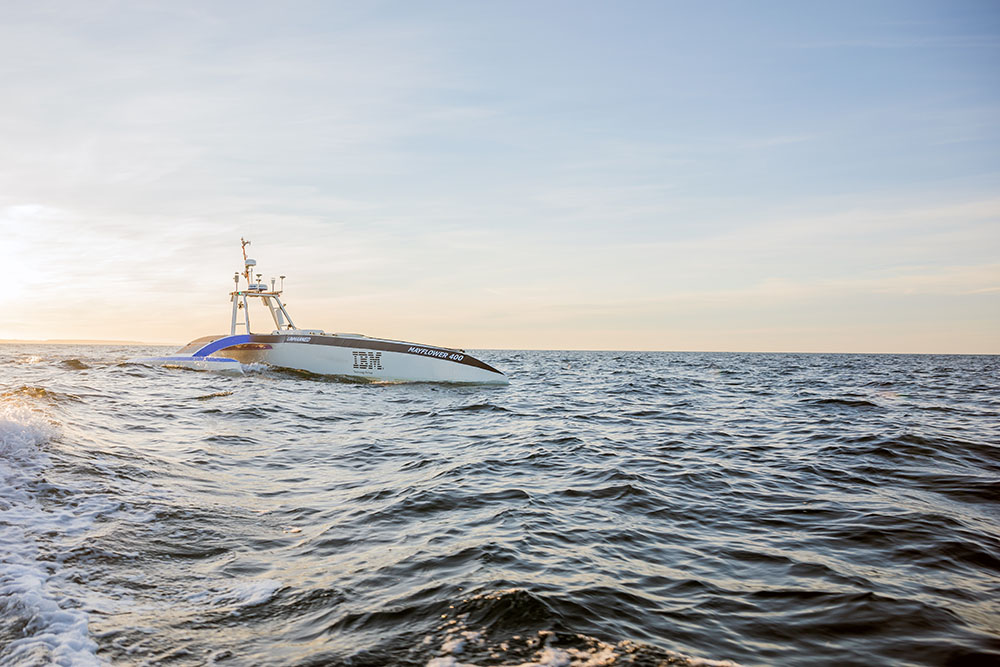The Mayflower Autonomous Ship Project
Mayflower Autonomous Ship – Transatlantic Mission Overview and Status Update
 |
MAS400 in Atlantic crossing attempt, June 2021 (credit Oliver Dickinson for ProMare/IBM) |
Plymouth, UK, 20th July, 2021… On June 15th 2021, marine research non-profit ProMare made an attempt to cross the Atlantic with the crewless Mayflower Autonomous Ship (MAS400). The mission was halted after three days due to a glitch with the ship’s hybrid propulsion system prompting a decision to return to base. MAS400 is currently in dry dock in Turnchapel Wharf, Plymouth, UK, while ProMare’s team performs repairs and improvements. Following a thorough assessment of the ship over the past few weeks, ProMare has provided the following overview of the mission and current status of the vessel:
Mission overview
Over the course of three days, MAS400 cruised at an average speed of 7 knots covering a distance of 450 nautical miles in a west-southwest direction. During this time the ship performed well and demonstrated its ability to handle ocean conditions.
The team was able to successfully monitor the operation of Mayflower and the supporting software. Based on IBM Automation software, the AI Captain demonstrated its ability to correctly assess the current environment, identify and avoid hazards and maintain situational awareness using the ship’s edge computing capabilities. Significantly, the distributed nature of the software allowed hot fix updates to address the shifting needs of the control software during the recovery effort.
The ship’s science experiments and live streaming of video and data from the ship all performed well for the time they were operational. Running on the IBM Cloud, the MAS400.com web portal displayed live video and data to over 40 thousand followers during the days of the Atlantic crossing attempt.
“Despite the setback, we’ve learnt a lot and we’re more encouraged than ever that the Mayflower will safely navigate the world’s oceans in the near future,” said Brett Phaneuf, Director of the Mayflower Autonomous Ship Project.
Fault development
On the evening of June 17th, 2021, the ship developed a problem with its hybrid propulsion system resulting in a loss of full-power and speed. Following a remote assessment, ProMare’s support team determined that it was likely due to a mechanical issue with the ship’s generator that was not possible to repair without human intervention.
Because MAS400 was only a few days into its journey, ProMare’s team issued a command to the ship to turn around and head back to base. MAS400 travelled under its own steam for 30 hours before its speed was reduced to around 3 knots. At this point MAS400 went into loiter mode to conserve enough power for its communication and video systems.
On June 19th, 2021, a support boat was sent to the ship’s exact location, as provided by its VERIPOS receivers, and the ProMare team was able to attach a line to begin the recovery process.
Fault assessment
Once back at base, ProMare determined that the issue had been caused by a fracture in the flexible metal coupling between the ship’s generator and exhaust system. MAS400 uses solar panels to draw as much energy as possible from the sun. An onboard generator switches on automatically to top up the battery when required. Following the fracturing of the coupling, MAS400 had to rely solely on solar power, but the bad weather and rough seas at the time meant that MAS400 did not generate enough solar power to continue its journey.
Repairs & Improvements
MAS400 is currently out of the water undergoing a thorough inspection and repair. The generator has been removed and a replacement ordered. ProMare is performing a redesign of the coupling and is also taking the opportunity to upgrade some of the edge computing devices in order to increase the onboard processing power.
What’s next?
ProMare aims to have MAS400 back in the water in the next few weeks. Following tests and long-range trials, ProMare will make a decision about the ship’s next missions and the timing of next Atlantic crossing attempt.
About the Mayflower Autonomous Ship
With no human captain or onboard crew, the Mayflower Autonomous Ship (MAS) uses AI and the energy from the sun to travel further and reveal more about the ocean. Working in tandem with scientists and other autonomous vessels, MAS provides a flexible and cost-effective platform for deepening understanding of critical issues such as climate change, ocean plastic pollution and marine mammal conservation. In parallel, the development of marine autonomous systems promises to transform ocean-related industries such as shipping, oil & gas, telecommunications, security & defence, fishing & aquaculture. The Mayflower Autonomous Ship project is led by marine research organisation ProMare with IBM acting as both lead technology partner and lead scientific partner for the project. Other partners are listed here.